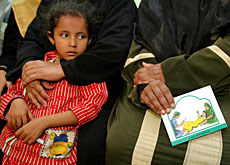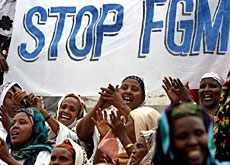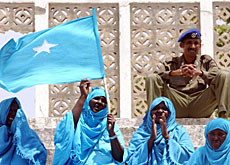Unicef calls for ban on female circumcision

The Swiss section of the United Nations children's organisation, Unicef, is calling for female genital cutting to be banned in Switzerland.
Female mutilation is not limited to Africa, with doctors in Switzerland reporting an increasing number of mutilated girls and women as patients, as a result of migration.
During a day of action to mark International Women’s Day on Thursday, Unicef will demand the introduction of legislation to prohibit the practice.
Around 130 million women are affected worldwide and Unicef claims that up to a further three million girls, mostly aged between four and 12 years, have their genitals cut every year.
The director of Unicef Switzerland, Elsbeth Müller, believes an explicit ban on the mutilation of girls in the Swiss penal code would not only have a preventive effect, but also clear up any ambiguities.
“Female circumcision is a human rights violation of a healthy body,” she told swissinfo. “It is a mutilation and as such should not be tolerated.”
Unicef Switzerland has for years been campaigning against the extremely painful practice of female genital mutilation for years.
Traumatic results
It says the injuries from genital cutting often have traumatic results, including lifelong pain during intercourse and complications when giving birth.
Unicef, in cooperation with other organisations, has prepared a handbook for healthcare personnel who deal with mutilated women and girls.
Genital cutting is a cultural tradition in many African countries, with girls who have not been circumcised deemed unfit for marriage. Unicef Switzerland has supported successful educational campaigns in Burkina Faso, Somalia and Gambia.
Müller rejects criticism of interference in a foreign culture: “All cultures have their own ideas about physical inviolability.
“Female circumcision has over the centuries become a phenomenon that produces only health problems. It can result in the deaths of girls and mothers when they give birth.”
European issue
As a result of immigration from Africa, genital cutting has also become an issue in Europe. It has been banned in Austria, Belgium, France, Denmark, Britain, Norway, Spain and Sweden.
According to Unicef estimates, around 7,000 circumcised women live in Switzerland alone. The organisation considers they do not receive enough protection.
“These circumcisions were not carried out by doctors in Swiss hospitals but done in secrecy,” Müller said.
Girls are either taken abroad or those who carry out the cutting travel to Switzerland and circumcise them before leaving the country.
Humanitarian organisations have long been calling for asylum to be granted to those girls and young women who are threatened by female circumcision in their countries of origin.
“A threat of mutilation is not a valid reason for the granting of asylum but it can delay deportation,” said Müller.
Parliamentary initiative
The legal commission of the House of Representatives agreed in December to discuss a parliamentary initiative demanding a ban on female circumcision.
The initiative calls not only for prosecution of those who carry out or support genital cutting in Switzerland, but also of those who support the practice abroad.
In a new legal opinion on the issue, Unicef Switzerland comes to the conclusion that two forms of circumcision – infibulation and excision – cause serious bodily harm. Two other forms are considered to inflict “minor bodily harm”.
Unicef is therefore supporting the parliamentary move that calls for an explicit ban on female genital cutting to be included in the law. This, it argues, would be a signal in the fight against female circumcision.
swissinfo, Susanne Schanda

More
Parliamentary initiative
Most frequent incidence of female circumcision (Unicef figures)
Guinea: 99% (circumcision legally banned since 2002)
Egypt: 97% (legally banned since 1996)
Mali: 92% (punishable as bodily harm)
Somalia: around 90%
Sudan 90%
The United Nations declared March 8 International Women’s Day in 1975.
Women’s organisations use the day to raise social, political and legal issues that concern women.
A Swiss parliamentary delegation, which includes the speaker of the House of Representatives, Christine Egerszegi, has asked the UN Commission on the Status of Women for better protection for women and children against violence, abuse and discrimination.
All types of abuse against girls are unacceptable and are a breach of children’s rights, Swiss UN ambassador Peter Maurer told the commission.
The World Health Organization says one in five women have been sexually abused.
25% of parliamentarians are women, up from 5% in 1971. Switzerland ranks 31 out of 190 countries in female national parliamentary representation.
In 2004, the average wage for a woman was SFr4,735 – almost 20% lower than that of a man, who earned SFr5,910.
Three-quarters of men aged over 15 were employed, as opposed to 60% of women. 57% of women were employed part time compared with just 12% of men.
Eight out of ten women who lived with a partner and had children described themselves as housewives.
In 2005, 57% of students who obtained a school-leaving certificate were women, but more women than men (23% versus 13%) did no further education.

In compliance with the JTI standards
More: SWI swissinfo.ch certified by the Journalism Trust Initiative


You can find an overview of ongoing debates with our journalists here . Please join us!
If you want to start a conversation about a topic raised in this article or want to report factual errors, email us at english@swissinfo.ch.